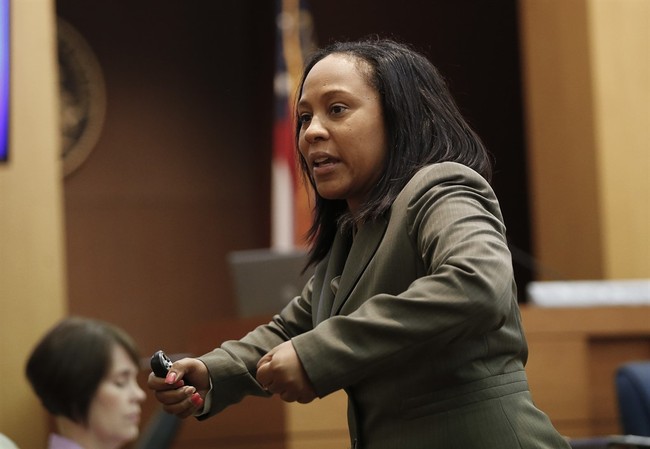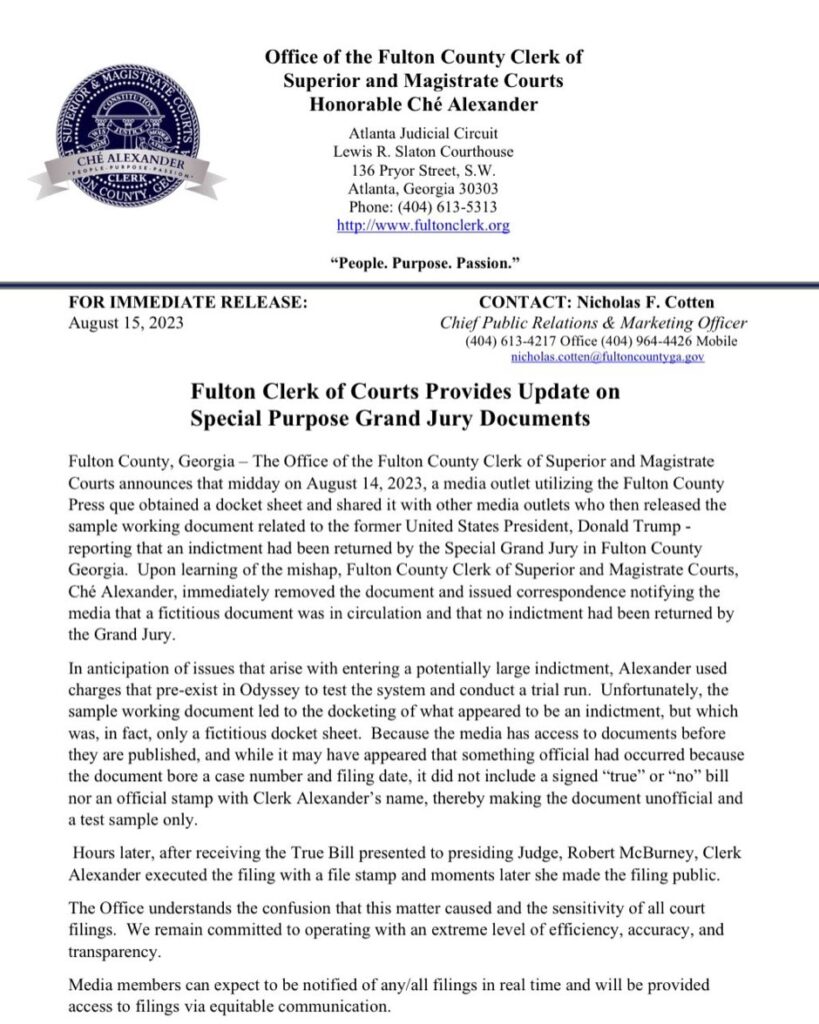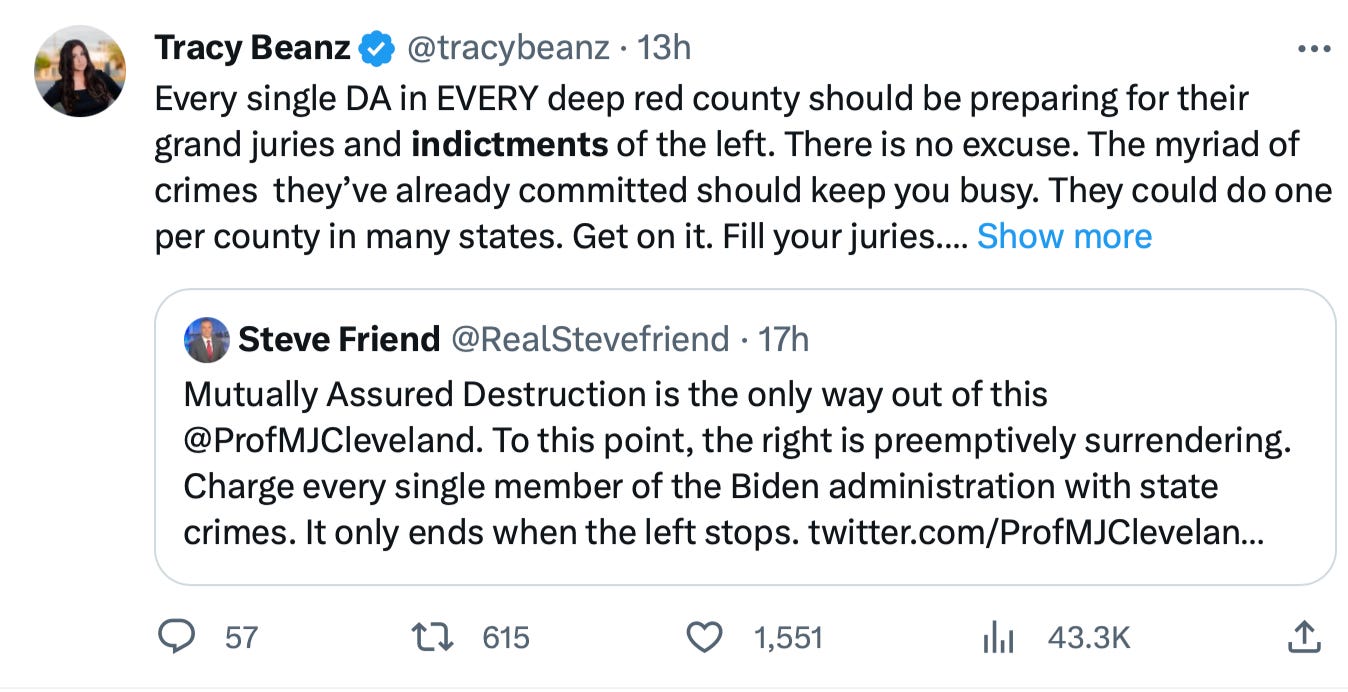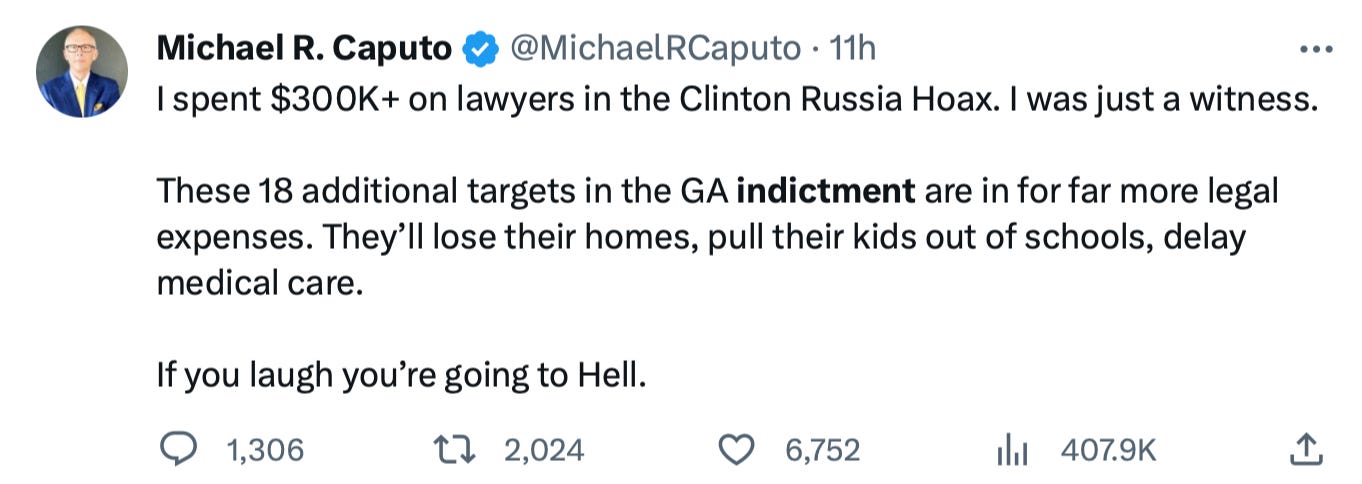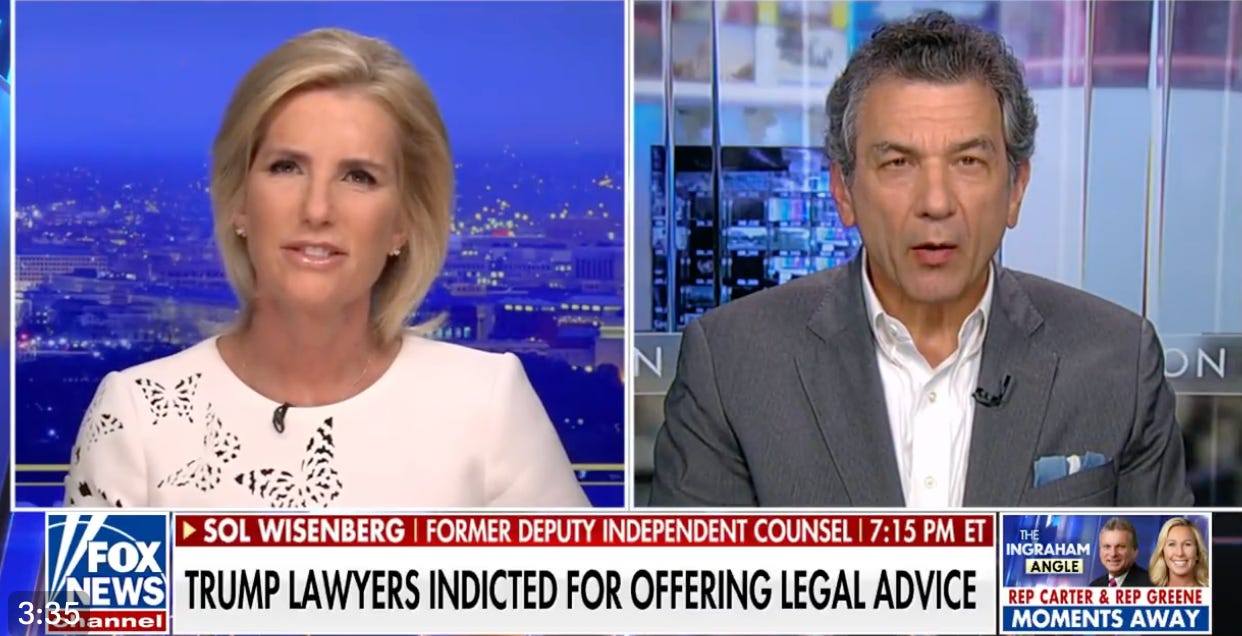Lawyers as Co-Conspirators? Seriously?
By naming as alleged co-conspirators the lawyers who were representing Trump and providing him with advice and counsel in the legal actions that were in the state and before legislators during public hearings and in private conversations, Willis is also attacking the fundamental way that our justice system works, in which lawyers are tasked with vigorously pursuing the interests of their clients.
Under the crazy legal theories being pushed in her indictment, every lawyer in Georgia who represents a defendant and makes statements that turn out to be wrong or legal arguments that are ultimately rejected could be accused of conspiring with his or her client to commit a crime.
In other words, they could be charged with a crime for doing what the professional code of conduct tells the lawyer he is supposed to do; namely, represent the interests of his client to the best of his abilities.
The 98-page indictment contains 41 counts, all of which are centered around Georgia’s “RICO” statute— the Racketeer-Influenced and Corrupt Organizations Act—and it includes “co-conspirators,” among them Trump’s former chief of staff, Mark Meadows; and Trump’s former lawyers, among them Rudy Giuliani.
This is a statute that was designed to go after mob operations and the kinds of criminal conspiracies run by dangerous drug cartels, not candidates contesting an election outcome.
Speech on TV an ‘Illegal’ Act? Seriously?
The first “illegal” act listed is Trump on Nov. 4, 2020, making a “nationally televised speech falsely declaring victory in the 2020 presidential election.” She makes similar ridiculous claims against other defendants, such as Giuliani, for example, because he “appeared at a press conference at the Republican National Committee Headquarters” making similar “false statements concerning fraud” in the 2020 election.
Willis even laughably lists as part of the unlawful conspiracy many public tweets by Trump, such as one on Dec. 3, 2020, and another on Dec. 30, urging the public to watch the live coverage of the Georgia legislature’s hearings on the 2020 election. Or another tweet on Dec. 30 thanking the Georgia legislature “for today’s revealing meeting!” that Trump said uncovered “Massive VOTER FRAUD.”
Under that bizarre notion, would the legislators who participated in those hearings, listened attentively, and considered the allegations that had been raised be unindicted co-conspirators? That is how nutty Willis’ claims are—claims that are a direct attack on political speech.
Willis should have received a failing grade in constitutional law in law school since Trump’s speech and all of the other public and private statements made by Giuliani and the other political targets of her indictment—sorry, I mean defendants—were fully within their rights under the First Amendment to engage in “freedom of speech” and voice their complaints, concerns, and grievances about the election—even if those turned out to be wrong.
Even special counsel Jack Smith acknowledged in the federal indictment that was returned a couple of weeks ago that “[t]he Defendant had a right, like every American, to speak publicly about the election and even to claim, falsely, that there had been outcome-determinative fraud during the election and that he had won. He was also entitled to formally challenge the results of the election through lawful and appropriate means, such as by seeking recounts or audits of the popular vote in states or filing lawsuits challenging ballots and procedures.”
Apparently, Willis doesn’t agree.
If It Was Illegal, Why Wasn’t Abrams Charged?
Whether or not Trump or Giuliani or anyone else was right or wrong about what happened in that election is irrelevant.
They had every right to make that claim then, and every right to make that claim today, the same way that Democrat Stacey Abrams had every right to make the identical claim about her two runs for governor in Georgia.
She was clearly wrong, and Republican Brian Kemp is the validly elected governor of the state. But the fact that she and her supporters and allies are wrong doesn’t make them part of some grand criminal conspiracy to overturn an election.
But then, Abrams is a Democrat like Willis, so I am sure the thought of targeting Abrams with similar charges never occurred to Willis.
The indictment recites other acts that Willis claims were in furtherance of the conspiracy and intended to interfere with the election results that involved various defendants, such Giuliani and Meadows contacting state legislators as well as members of Congress to persuade them to take action to correct what they viewed as a stolen election.
Texting for Phone Numbers Illegal? Seriously?
That included the supposedly illegal action of Meadows, listed as Act 8, of texting a message to Rep. Scott Perry, R-Pa., asking him for “the number for the speaker and the leader of PA Legislature” because “POTUS wants to chat with them.”
No, really: That is listed as a criminal violation of the law!
Keep in mind that the First Amendment’s free speech provision protects the right of Trump, Meadows, Giuliani, and others to speak to state legislators about any subject and any claims—even if those claims, for example, turn out not to be true.
But another portion of the First Amendment protects their actions as well.
An often overlooked part of the First Amendment is the right of all Americans to “petition the Government for a redress of grievances.” Trump certainly had a grievance: He believed (and still believes) the election was stolen from him because illegal votes were counted and the votes of some legal voters were not. Trying to persuade state officials to correct that is fully within that protected right under the First Amendment.
Moreover, to the extent that Willis is trying to indict Trump for such actions while he was president, he has a very strong argument that any actions he took as president after November 2020 and before Jan. 20, 2021, including with state and local legislators and officials, were within the ambit of his official actions as president, and presidential immunity applies.
It may also apply to subordinates within the executive branch, like former Justice Department lawyer Jeff Clark, who is a named defendant.
18 Attorneys General Conspired? Seriously?
The Supreme Court refused to allow the case to go forward, but Willis is essentially saying that the attorneys general of 18 states were engaging in a conspiracy under her state’s RICO law to try to “unlawfully change the outcome of the election in favor of Trump” by supporting such claims, including in Georgia.
That is just how odious this indictment is and how wrong her claim is that all of the defendants in this case “knew” that the claims they were making about the problems and irregularities in the Georgia election were false.
The claims made against the lawyers in the case, such as Ray Smith (an outstanding, ethical, highly professional lawyer I’ve known for 30 years), are especially obnoxious and a blatant attack on the way our justice system operates. He supposedly engaged in a criminal violation of the law by presenting the claims of his client to state legislators at the legislative hearings investigating the election and by participating in efforts to provide a contingent, alternative slate of Trump electors that could be used by those legislators if they determined that the claims about the invalidity of the election were correct.
Fani Willis is trying to criminalize free speech and have a chilling effect on anyone who might dare to question the results of an election.

www.dailysignal.com

